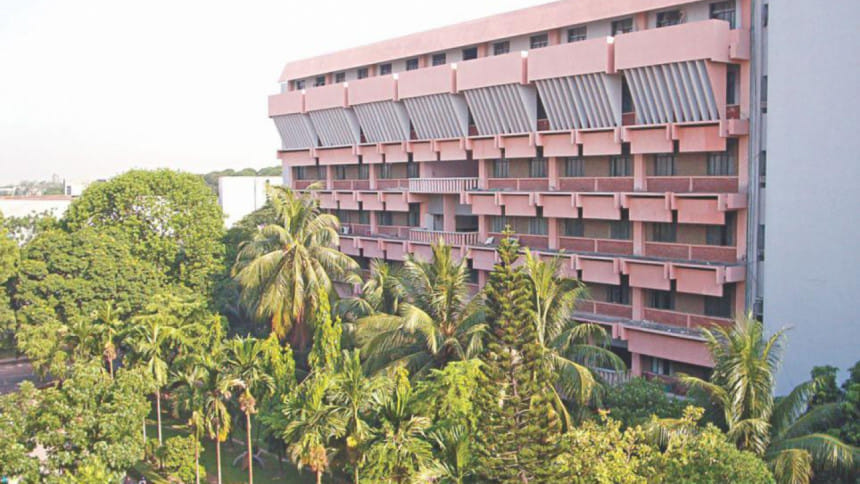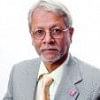I too am Chhatra League

1974. BUET Elections. The position of Mujibbadi Chhatra League was not at all rosy. The major threat was the student wing of Jatiya Samajtantrik Dal (JSD), drawing young people in droves by its patent 'Scientific Socialism'. Another front was Chhatra Union, popular among cultural activists.
Mujibbadi Chhatra League nominated me for the post of Sports Secretary of Titumeer Hall Students Union. JSD, Chhatra League and Chhatra Union also fielded panels. My opposite numbers were my sports teammates and very close friends as well as batch mates (although they were from Engineering department and I from Architecture).
You are right. I would not be narrating this tale had I lost forty-five years ago. Our Mujibbadi Chhatra League won full panel in Titumeer Hall and Ahsanullah North (reserved for Hindu students, although they were free to reside in other halls). But that was it. We got a drubbing in all the other four halls of the time, Ahsanullah, Nazrul Islam, Sher-e-Bangla and Suhrawardy.
The lead Mujibbadi EUCSU VP candidate, Rashedul Hassan (Architecture graduate, but studying Urban & Regional Planning) took in Titumeer and Ahsanullah North was barely enough by only six votes to overcome his JSD opponent, AZM Akramul Haq, who had won handsomely in all the other halls. Rashedul Hassan was EUCSU's incumbent VP and Akram the General Secretary.
Only for record's sake, I received the highest votes among all candidates in all the six halls. But that never got into my head, nor did anyone make it a celebratory issue. My "political" opponents, by far more gifted players, and I continued to partake in different games at hall and university levels without a word about the voting results.
Dr Rashedul Hassan Bhai passed away about a year ago at his Barishal village. Engr. Akram Bhai greets me with an embrace every time we meet. Last week we smilingly recalled the famous elections. Despite our ideological differences, he never tried to burn my boat with his mashal, nor did I consider drenching his burning flame with nouka loads of water.
That was my only election during my five-year undergraduate studies at Buet, because student politics all over the country were on hold for more than five years after August 15, 1975.
Early on that ill-fated morning in 1975, a Boro Bhai awakened me. I heard on radio "Ami Major Dalim bolchi. Sheikh Mujib ke hotta kora hoyeche. (This is Major Dalim speaking, Sheikh Mujib has been murdered)", or to that effect. We were stunned, not grasping what happened, not knowing what lay ahead. My first thoughts were with (Sultana Ahmed) Khuki Apa, by whose invitation I attended her wedding to (Sheikh) Kamal Bhai only a month earlier. Apa was a Mohammedan supporter. Sometime during his last few days, Kamal Bhai taunted me jovially at the Dhaka Stadium, "Now what will you do? I have married your sister!"
Later that morning, we gathered in uneasy trepidation at the hall entrance with others from all political shades. There was no thought of attacking any of us (Mujibbadi) from any quarter, outside or inside the campus. No one made even a verbal rebuke despite our leader Bangabandhu Sheikh Mujibur Rahman, his family, relatives and staff being murdered in the most brutal and cowardly manner. That co-existential Buet-ian brotherhood prevailed for all the remaining years of my student life and thirty-two years of teaching at Buet.
In our days, whilst a boisterous michil of one political thinking passed another procession equally animated, some of us at the rear would exchange a poke or a pat with an adversary in jest, trade a quick smile, and continue with "Amader Sangram, cholbe, cholche", whatever that was concocted to mean. No one forced anyone to join anything. No one questioned if someone did not. We, from different political symbols, met afterwards for tea and snacks at a canteen, or at Kunnu Miah's tea shop under a worn-out tin sheet. Whoever had money, paid the bill, irrespective of Joy Bangla or Boigyanik Samajtantra.
In room-to-room election campaign, we hardly put forward any national issues smeared with partisan hue. I was introduced as the only scorer in hockey for Mohammedan Sporting. Thankfully, no one asked how many, because that year our club scored only that goal.
I had to remain hall sports secretary for the following four years since there was no more elections due to a ban on student politics. No one proposed removing me from my post. No one misbehaved with me because I was Chhatra League, and Awami League was not then in power. From junior I became senior, and then in my fifth year I was senior-most in the university, but I never bullied anyone despite being in authority for such a long period.
Every time an individual or a team from my hall became champions in an inter-hall sports event, it was my privilege as sports secretary to take them out for Chinese. The hall had a budget under the audit of the provost. We went by rickshaw to the restaurant. If it rained, we waited for dry weather. Our spirit was never dampened.
As an Architecture student, I would often return from my departmental studio to my room (401 South) very late. The barely lit dark roads, stairs and corridors were the safest places on earth. Never did we feel insecure, nor were we terrorised by any group. For months, I stayed alone in that room because my engineering roommates emigrated elsewhere due to my unearthly hours. Rooms were shared also by candidates or adherents of different parties and political beliefs.
Our halls were a piece of paradise on earth. Our chitchats and even serious conversations were about studies, term-end grand feasts, sports, achievements, natok, BTV, inter-hall competitions, the needs of studentship… okay, girls too.
During power outages, shouting match ensued with adjacent halls in often the foulest of words but under the friendliest of terms. There was no love lost between the voluntary contestants, who enjoyed celebrity status, and a round of shared kabab-parota after the lights came on.
The access to the hall roof was via a steep steel ladder. I may have ventured to the roof once or twice, and by my own choice. There was so much to do below in the common room, the veranda and the garden, such as dunking someone for going steady.
I should have said this earlier, but today I must admit my seniors were angels.
I too am Chhatra League, I say that with pride, pleasure and pain.
Dr Nizamuddin Ahmed is a practising architect, a Commonwealth Scholar and a Fellow, a Baden-Powell Fellow Scout Leader, and a Major Donor Rotarian.

 For all latest news, follow The Daily Star's Google News channel.
For all latest news, follow The Daily Star's Google News channel. 



Comments